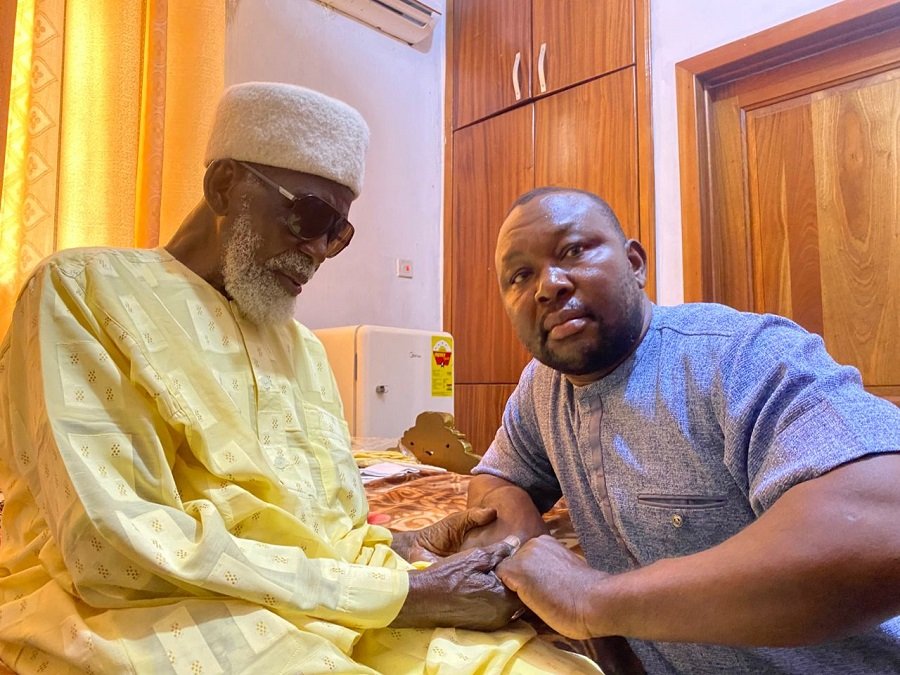Fruitful Living
Do you remember? (Part II)
For God did not send His Son into the world to condemn the world, but to save the world through Him.” – John 3:17
INTRODUCTION
We are happy to bring you part two of the above article published on Saturday, April 15, 2023. We are pleased to repeat the last paragraph for ease of reference. Please enjoy and pass it on to others!
“Do you remember why He died for you? And do you remember that He lives interceding for you so you will not be lost? What has changed about your life since you pondered the account of Easter this year? Remember, He did not die in vain. Remember, you should not hear the account of His death or profess your belief in His sacrifice in vain. If you recognize that, then you should accept Him as your Lord and Saviour. And if you accept Him as Lord, then you should let Him to have full reign and take charge of your life.”
JESUS IS LORD
Many think that the message of Jesus as Lord is so that unbelievers accept Him. It is however a message that is as much for us believers in Christ as it is for those who have not yet accepted Him. It is not enough to believe that Jesus saves, we have to accept that because He saves, He has the wisdom to tell us how to live our lives. And those who have truly been saved will not have any problem with giving Him the reins of control over their lives.
Though the two are inseparable, if you choose to separate them, then you cannot get farther than that the message of Christ as Saviour is a part of the message of Christ as Lord. Both are parts of the same message. And both remind us that Easter is not just an annual event, but an everlasting event. It is because Christ died that we have hope today. Though our world is rotten, our lives are renewed daily because Christ rose from the dead and is alive.
HE DIED THAT WE MIGHT LIVE
Remember the key text? “For God did not send His Son into the world to condemn the world, but to save the world through Him.” (John 3:17). Many who doubted His powers before His death became convinced after His resurrection that He is the rightful One to order and direct our lives. What’s more? We don’t have to beg or wait in line for Him to do that. It’s what He wants to do for us, out of love. As a matter of fact, He extended the invitation to us when He shed His blood. All we need to do is to respond to it.
The apostle Paul summarises the post-crucifixion reality for all of us who accept the sacrifice of Christ on our behalf in Romans 8. I encourage you to read the whole chapter, but for this article, I have chosen the first 17 verses.
“Therefore, there is now no condemnation for those who are in Christ Jesus, because through Christ Jesus the law of the Spirit who gives life has set you free from the law of sin and death. For what the law was powerless to do because it was weakened by the flesh, God did by sending his own Son in the likeness of sinful flesh to be a sin offering. And so he condemned sin in the flesh, in order that the righteous requirement of the law might be fully met in us, who do not live according to the flesh but according to the Spirit. Those who live according to the flesh have their minds set on what the flesh desires; but those who live in accordance with the Spirit have their minds set on what the Spirit desires. The mind governed by the flesh is death, but the mind governed by the Spirit is life and peace. The mind governed by the flesh is hostile to God; it does not submit to God’s law, nor can it do so. Those who are in the realm of the flesh cannot please God. You, however, are not in the realm of the flesh but are in the realm of the Spirit, if indeed the Spirit of God lives in you. And if anyone does not have the Spirit of Christ, they do not belong to Christ. Therefore, brothers and sisters, we have an obligation—but it is not to the flesh, to live according to it. For if you live according to the flesh, you will die; but if by the Spirit you put to death the misdeeds of the body, you will live. For those who are led by the Spirit of God are the children of God. Now if we are children, then we are heirs—heirs of God and co-heirs with Christ, if indeed we share in his sufferings in order that we may also share in His glory. – Rom. 8:1-17
JESUS IS ALIVE
In closing, Bill Gaither reminds us of our hope as believers in his classic hymn, Because He Lives.
1. God sent His son, they called Him, Jesus; He came to love, heal and forgive;
He lived and died to buy my pardon, An empty grave is there to prove my Saviour lives!
Chorus:
Because He lives, I can face tomorrow, Because He lives, all fear is gone;
Because I know He holds the future, And life is worth the living, Just because He
lives!
2. How sweet to hold a newborn baby, And feel the pride and joy He gives;
But greater still the calm assurance: This child can face uncertain days because He Lives!
3. And then one day, I’ll cross the river, I’ll fight life’s final war with pain;
And then, as death gives way to victory, I’ll see the lights of glory and I’ll know He lives!
To Ponder: Charles Swindoll, the beloved American theologian reminds us that “Jesus has prepared the way and has made following our destiny possible, whereas we are helpless by ourselves. We can find and fulfill our purpose by responding to the clear, simple call of Jesus Christ: “Follow Me.” He is the doorway to fulfilling our destiny, where our divine design and God-ordained purpose live in perfect harmony.”
STAY BLESSED!
For further inquiries please contact us on Tel Nos. 0243588467 or 0268130615
Email: saltnlightministries@gmail. com
Website: saltandlightgh.org
“
By Dr. Joyce Aryee, the author
Fruitful Living
What Will Heaven Be Like?

Heaven is a place of hope
Look! God’s dwelling place is now among the people, and He will dwell with them. They will be His people, and God Himself will be with them and be their God.”
— Revelation 21:3
Introduction
As we journey through life, the thought of a future home with Jesus fills our hearts with peace and anticipation. Heaven is not just an abstract idea or a distant place, but it is God’s promised home for those who believe in Him. Today, we will explore what heaven will be like according to Scripture, how it intersects with the new earth, and why this promise is central to our faith.
1. Heaven: God’s Dwelling Place
Heaven is described as the central dwelling place of God, where He rules the universe from His throne. Although God is omnipresent, heaven is uniquely where His glory is most fully displayed. The Bible promises that when Christians die, they immediately go to heaven to be with Christ (Luke 23:43). However, this is not the final destination. One day, God will bring heaven down to earth, transforming the current heaven into what the Bible calls the “new heaven and new earth.”
This concept is revolutionary. While many imagine that heaven is a place where believers escape the troubles of the earth, the Bible reveals that God’s ultimate plan is to dwell with His people on a renewed earth. As Revelation 21:1 says, “Then I saw ‘a new heaven and a new earth,’ for the first heaven and the first earth had passed away.”
2. Heaven on Earth: The New Creation
God’s plan has always included not only redeeming humanity but also restoring creation. The fall of Adam and Eve affected not only mankind but the entire universe. However, God’s redemption plan extends to all of creation. Isaiah 65:17 promises, “See, I will create new heavens and a new earth.” This new earth will be free from sin, corruption, and death.
The future heaven, or new earth, will be a place where the glory of God is fully revealed. Jesus’ resurrection secured this future, as His victory over sin and death ensures that all of creation will be renewed. It will be a place of perfect fulfillment, joy, and peace—a world where God Himself will walk with His people once more, just as He did in the Garden of Eden.
3. The Throne of God: Reigning with Christ
In the present heaven, God’s throne is the central feature. Yet, when the new earth is created, His throne will be established there. Revelation 22:3 says, “The throne of God and of the Lamb will be in the city.” This means that the new earth will literally be “heaven on earth.”
Believers will reign with Christ in this new creation, reflecting the original purpose for humanity. In Genesis 1:28, God gave Adam and Eve dominion over the earth, and in the new earth, this dominion will be fully realised. Believers will serve God, not in tedious labour but in joyful, meaningful work. The Bible promises that we will reign with Him forever, ruling as His children in a perfect, restored world.
4. The Uniting of Heaven and Earth
A remarkable truth about the new heaven and new earth is that they will not be two separate realms. Instead, they will be united under Christ. Ephesians 1:10 describes God’s plan to “bring unity to all things in heaven and on earth under Christ.” This means that there will no longer be a division between the spiritual and physical realms.
Just as the curtain separating God from humanity was torn when Christ died, the barrier between heaven and earth will be removed in the new creation. The result will be one seamless universe, where God dwells among His people forever.
5. The Wonders of the Holy City: New Jerusalem
The Bible describes the New Jerusalem as a city of unparalleled beauty and glory. Revelation 21:2 reveals that the city will descend from heaven to earth, and it will be the capital of the new earth. This city is described as having gates that are always open and streets of pure gold. Revelation 21:24 says, “The nations will walk by its light, and the kings of the earth will bring their splendour into it.”
This implies that the new earth will have cultures, nations, and rulers—all redeemed and purified. The diversity of people and cultures on the new earth will reflect the creativity of God. All the best aspects of history, culture, and art will be restored and redeemed for God’s glory.
6. Life on the New Earth: Joy and Fulfillment
Life on the new earth will be anything but boring. Some people mistakenly believe that heaven will be a place of endless inactivity, but this is far from the truth. Revelation 22:3 tells us that “His servants will serve Him.” Our work in heaven will be fulfilling and without the curse of sin. We will use our talents and gifts to glorify God in everything we do, and our desires will perfectly align with His will.
The new earth will also be a place of feasting, fellowship, and joy. Matthew 8:11 promises that we will dine with Abraham, Isaac, and Jacob in the kingdom of heaven. The Bible often depicts heaven as a banquet, where we will enjoy food, drink, and celebration with Christ as the guest of honour.
We will also have the opportunity to continue learning, growing, and exploring God’s creation. The wonders of the new earth will be endless, as Ephesians 2:7 says, “in the coming ages He will show the immeasurable riches of His grace.” We will spend eternity discovering new aspects of God’s greatness and beauty.
7. The Restoration of Relationships and Creation
One of the most comforting promises of the new earth is the restoration of relationships. In heaven, all brokenness will be healed. There will be no more pain, sorrow, or death. God will wipe every tear from our eyes, and we will be reunited with loved ones who have also placed their faith in Christ. The relationships we experience in heaven will be free from sin and full of love, as we will know each other fully and perfectly in Christ.
Moreover, the new earth will see the restoration of creation itself. The Bible suggests that even animals will be present on the new earth. Isaiah 65:25 describes a world where “the wolf and the lamb will feed together.” This imagery points to a peace that extends to all of creation.
Conclusion
Heaven, as revealed in Scripture, is not a distant or abstract place. It is our true home, where we will dwell with God forever. The new heaven and new earth will be a place of unimaginable beauty, joy, and fulfillment. As we look forward to this future, we are reminded of God’s incredible love and grace. He desires to be with us, and His plan from the beginning has been to dwell among His people. Let us live in light of this hope, sharing the good news of the gospel and anticipating the day when heaven and earth are united under Christ.
Stay blessed!
For further inquiries please contact us on Tel Nos. 0302-772013 or 0268130615
Email: saltnlightministries@gmail.com
Website: saltandlightgh. org
“
- By Dr Joyce Aryee, the author
Fruitful Living
National Chief Imam blesses Muslim Youth in Agriculture project

The National Chief Imam with Mr Mensah at his residence at Fadama
The National Chief Imam, Sheikh (Dr) Osman Nuhu Sharubutu, has urged Ghanaian Muslims to venture into agriculture in order to enhanced food security in the country.
The Chief Imam said this when the Managing Director of Sky Dolphin Limited, Wisdom Mensah, paid a courtesy call on him at his residence at Fadama, a suburb of Accra on Monday.
Mr Mensah presented a gift to the National Chief Imam in support of his planned anniversary of the birth of Prophet Muhammad (Maulid) which comes off today October 5 at Fadama.
The National Chief Imam asked for Allah’s blessing for the success of the Muslim Youth in Agriculture project.
Mr Mensah is supervising the Muslim Youth in Agriculture project, a partnership between the Muslim community and the Sky Dolphin Limited, which involves novel aquaponics project, a mixture of fish farming and crop farming, aimed at creating jobs for the teeming unemployed Muslim youth as well as vulnerable rural Muslim women.
The representatives of the Islamic Community on the Muslim Youth in Agriculture, aquaponics projects are Sheikh Mustapha Ibrahim, the founder and chairman of the Islamic Council for Development and Humanitarian Services in Ghana (ICODEHS) and Special Advisor to the National Chief Imam, Imam Mohammed Awal Alhassan, the Metropolitan Chief Imam of Takoradi and Greater Accra Chief Imam of the Dagomba Community, Sheikh Yusuf Farouk Alhassan Umar Yussifiya, the Imam of Yussifiya Mosque in Kumasi and Acting Chairman of the National Hilal Committee of Ghana and Alhaji Khuzaima Mohammed Osman, Eminent Member and Chairman of the Greater Accra Regional Peace Council of the National Peace Council of Ghana and Executive Secretary of the Tijjaniya
By Spectator Reporter







